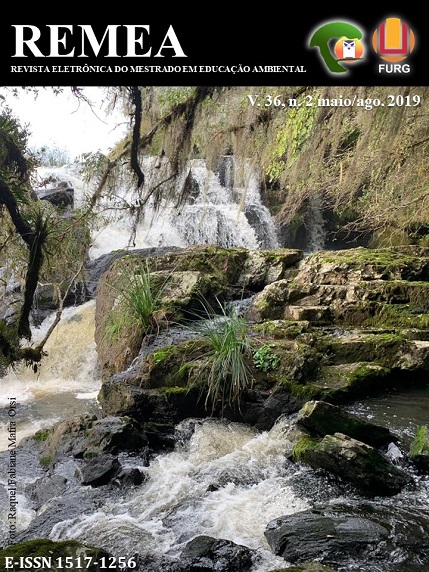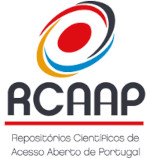Currículo ambiental: o significado da formação ambiental na educação superior
DOI:
https://doi.org/10.14295/remea.v36i2.9062Palavras-chave:
currículo ambiental, formação ambiental, significados.Resumo
Face aos problemas ambientais contemporâneos, as Instituições de Ensino Superior incluem no currículo a dimensão ambiental como intuito de formarem indivíduos capazes de orientar sua atuação em direção à sustentabilidade. Sem embargo, o estudo e desenho de dita formação, se apresenta carente de identidade teórica, situação que pode obstaculizar o estabelecimento de estratégias plausíveis. A investigação realizada se situa no paradigma metodológico interpretativo e utiliza a análise política do discurso para elucidar os significados da formação ambiental e contribuir na construção de sua identidade. Assim, foram analisados planos e programas de estudo que apresentam ambientalização curricular em duas instituições de Ensino Superior em Hermosillo, Sonora, México. Como resultado, se encontraram elementos complexos que diferenciam a formação ambiental do processo educativo em geral e do processo de ensino-aprendizagem em particular.Downloads
Referências
ALFONZO, Norys; CURCU, Antonio. Una mirada estética del currículum: espacios de la sensibilidad para la conformación de subjetividades. Revista de Teoría y Didáctica de las Ciencias Sociales, 17, 57-74, 2011. Disponible en: http://www.saber.ula.ve/handle/123456789/35534
ALONSO, Ayme; ÁLVAREZ, Nivia; CASTILO, Jaime. Proceso formativo ambiental universitario: trascendencia en la carrera de arquitectura. Ciencia UAT, 11(2), 54-63, 2017. Disponible en: http://www.revistaciencia.uat.edu.mx/index.php/CienciaUAT/article/view/828/403
ANGHEL, Alina; DRAGHICESCU, Luminita; CRISTEA, Gabriela; GORGHIU, Gabriel; GORGHIU, Monica; PETRESCU, Ana. The Social Knowledge - a Goal of the Social Sustainable Development. Procedia - Social and Behavioral Sciences, 149, 43-49, 2014. Disponible en: https://doi.org/10.1016/j.sbspro.2014.08.187
AOKI, Ted. Curriculum in a new key: The collected works of Ted Aoki. Mahwah, NJ: Lawrence Erlbaum Associates, 2005.
BEYNAGHI, Ali; TRENCHER, Gregory; MOZTARZADEH, Fathollah; MOZAFARI, Masoud; MAKNOON, Reza; LEAL, Walter. Future Sustainability Scenarios for Universities: Moving beyond the United Nations Decade of Education for Sustainable Development. Journal of Cleaner Production, 112, 3464-3478, 2016. Disponible en: http://dx.doi.org/10.1016/j.jclepro.2015.10.117
CHARMAZ, Kathy. Constructing Grounded Theory. London: Sage, 2006.
CORBIN, Juliet y STRAUSS, Anselm. Basics of Qualitative Research: Techniques and Procedures for Developing Grounded Theory. USA: Sage Publications, inc., 2008.
CORTESE, Anthony; HATTAN, Amy. Education for Sustainability as the Mission of Higher Education". Sustainability: The Journal of Record, 3(1), pp. 48-52, 2010. Disponible en: https://doi.org/10.1089/SUS.2009.9802
DA SILVA, Tomaz. Espacios de identidad. Nuevas visiones sobre el currículum. Barcelona: Octaedro, 2001.
DE ALBA, Alicia. Curriculum y sociedad. El peso de la incertidumbre, la fuerza de la imaginación. México: Plaza y Valdés Editores, S. A. de C. V., 2007.
DE ALBA, Alicia y PETERS, Michael. Sujetos en proceso: diversidad, movilidad y políticas de subjetividad en el siglo XXI. México: iisue/UNAM, 2017.
DEWEY, John. Experience and education. United States of America: Touchstone, 1997.
EMBREE, Lester. Reflective Analysis. A first Introduction into Phenomenological Investigation. USA: Zeta books, 2011.
ESPINOSA, José; DIAZGRANADO, Luis; OJEDA, Rafael. La formación ambiental de los estudiantes. Recomendaciones para su consideración en la universidad. Universidad y Sociedad, 8(3), pp. 13-22, 2016. Disponible en: https://rus.ucf.edu.cu/index.php/rus/article/view/405
EZQUERRA, Geraldine; GIL, Jorge. ¿Incluir contenidos ambientales o formar con una perspectiva ambiental? RIPS. Revista de Investigaciones Políticas y Sociológicas, 13(2), pp. 123-137, 2014. Disponible en: http://www.usc.es/revistas/index.php/rips/article/view/2169/2452
FREIRE, Paulo. Pedagogía del oprimido. México: Siglo XXI, 2015.
FOUCAULT, Michel. La hermenéutica del sujeto. Argentina: Fondo de cultura económica, 2001.
GADAMER, Hans. Verdad y Método I. Salamanca: Sígueme, 1984.
GOUGH, Stephen y SCOTT, William. Higher Education and Sustainable Development. Paradox and possibility. USA: Routledge, 2007.
HEISKANEN, Eva; THIDELL, Ake; RODHE, Hakan. Educating sustainability change agents: the importance of practical skills and experience. Journal of Cleaner Production, 123, 218-226, 2016. Disponible en: http://dx.doi.org/10.1016/j.jclepro.2015.11.063
HOLM, Tove; SAMMALISTO, Kaisu; GRINDSTED, Thomas; VUORISALO, Timo. Process framework for identifying sustainability aspects in university curricula and integrating education for sustainable development. Journal of Cleaner Production, 106, 164-174, 2015. Disponible en: http://dx.doi.org/10.1016/j.jclepro.2015.04.059
HONORÉ, Bernard. Para una teoría de la formación. Dinámica de la formatividad. Madrid: Narcea, S.A. De ediciones, 1980.
KOŚCIELNIAK, Cezary. A consideration of the changing focus on the sustainable development in higher education in Poland. Journal of Cleaner Production, 62, pp. 114–119, 2013. Disponible en: http://dx.doi.org/10.1016/j.jclepro.2013.06.006
LACLAU, Ernesto. Nuevas reflexiones sobre la revolución de nuestros tiempos. Argentina: Nueva Visión, 1990.
LEFF, Enrique. El desvanecimiento del sujeto y la reinvención de las identidades colectivas en la era de la complejidad ambiental. Polis, Revista Latinoamericana, 27, pp. 1-40, 2010. Disponible en: https://journals.openedition.org/polis/862
LEVINAS, Emmanuel. La huella del otro. México: Taurus, 1998.
LOZANO, Rodrigo; YOUNG, William. Assessing sustainability in university curricula: exploring the influence of student numbers and course credits. Journal of Cleaner Production, 49, pp. 134-141, 2013. Disponible en: http://dx.doi.org/10.1016/j.jclepro.2012.07.032
MAGRINI, James. New Approaches to Curriculum as Phenomenological Text: Continental Philosophy and Ontological Inquiry. New York: Palgrave Macmillan, 2015.
MERLEA-PONTY, Maurice. Signos. Barcelona: Editorial Seix Barral, S.A., 1964.
MOLANO, Alba; HERRERA, Juan. La formación ambiental en la educación superior: una revisión necesaria. Revista Luna Azul, (39), pp. 186-206, 2014. Disponible en: http://vip.ucaldas.edu.co/lunazul/downloads/Lunazul39_12.pdf
PIEVANI, Telmo. The sixth mass extinction: Anthropocene and the human impact on biodiversity. Anthropocene natural and man-made alterations of the earth, (25), pp. 85-93, 2014. Disponible en: https://link.springer.com/article/10.1007%2Fs12210-013-0258-9
PORTELA, Henry. La formación en un currículo como trayecto fenomenológico. Un enfoque sociocrítico. Hallazgos, 9(18), pp. 79-96, 2012. Disponible en: https://doi.org/10.15332/s1794-3841.2012.0018.05
RIVAROSA, Alcira; ASTUDILLO, Mónica; ASTUDILLO, Carola. Aportes a la identidad de la educación ambiental: estudios y enfoques para su didáctica. Profesorado. Revista de Currículum y Formación de Profesorado, 16(2), pp. 213-238, 2012. Disponible en: https://recyt.fecyt.es/index.php/profesorado/%20article/view/43726/25607
RODRÍGUEZ, Gregorio; GIL, Javier; GARCÍA, Eduardo. Metodología de la investigación cualitativa. Málaga: Ediciones Aljibe, 1999.
RUIZ, Lourdes. Incorporation of Environmental and Sustainable Indicators in Universities. Journal of Environmental Protection, 7, pp. 825-830, 2016. Disponible en: https://www.scirp.org/journal/PaperInformation.aspx?PaperID=66398
SALDAÑA, Erika. Bildung y praxis. Formación y practica pedagógica. México: Ediciones Navarra, 2017.
SAUVÉ, Lucie; VILLEMAGNE, Carine. La ética ambiental como proyecto de vida y “obra” social: Un desafío de formación. Revista de investigación educativa, 21, 188-209, 2015. Disponible en: http://cpue.uv.mx/index.php/cpue/article/view/1713
SAVELYEVA, Tamara; MCKENNA, James. Campus sustainability: emerging curricula models in higher education”. International Journal of Sustainability in Higher Education, 12(1), pp. 55-66, 2011. Disponible en: https://www.emeraldinsight.com/doi/full/10.1108/14676371111098302
SCHMITT, Paola; RAUFFLET, Emmanuel. Sustainability in higher education: a systematic review with focus on management education. Journal of Cleaner Production, 106, pp. 22-33, 2015. Disponible en : http://dx.doi.org/10.1016/j.jclepro.2015.04.118
SUGIMAN, Toshio. “A Theory of Construction of Norm and Meaning: Osawa’s Theory of Body”. In Toshio Sugiman; Kenneth. Gergen; Wolfgang Wagner, y Yoko Yamada (Eds.), Meaning in Action. Constructions, Narratives, and Representations. Japan: Springer, 2008. pp.135-149.
THATHONG, Kongsak. An integration of teaching and learning activities on environmental education in the subjects. Research in Higher Education Journal, 7, pp.1-8, 2010. Disponible en https://www.aabri.com/rhej.html
VAN MANEN, Max. Researching lived experience. Human science for an action sensitive pedagogy. USA: State University of New York Press, 1990.
VENEGAS, María. El concepto pedagógico de formación en el universo semántico de la educación. Revista Educación, 28 (2), pp. 13-28, 2004. Disponible en: https://revistas.ucr.ac.cr/index.php/educacion/article/%20view/2251/2210
WATSON, Katherine; LOZANO, Rodrigo; NOYES, Caroline; RODGERS, Michael. Assessing curricula contribution to sustainability more holistically: Experiences from the integration of curricula assessment and students’ perceptions at the Georgia Institute of Technology. Journal of Cleaner Production, 61, pp. 106-116, 2013. Disponible en: http://dx.doi.org/10.1016/j.jclepro.2013.09.010
ZALASIEWICZ, Jan; WILLIAMS, Mark; HAYWOOD, Alan; ELLIS, Michael. The Anthropocene: a new epoch of geological time? Philosophical Transactions of the Royal Society, A (369), pp.835-841, 2011. Disponible en: https://royalsocietypublishing.org/doi/full/10.1098/rsta.2010.0339










